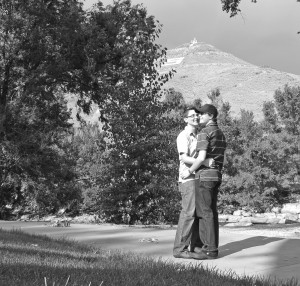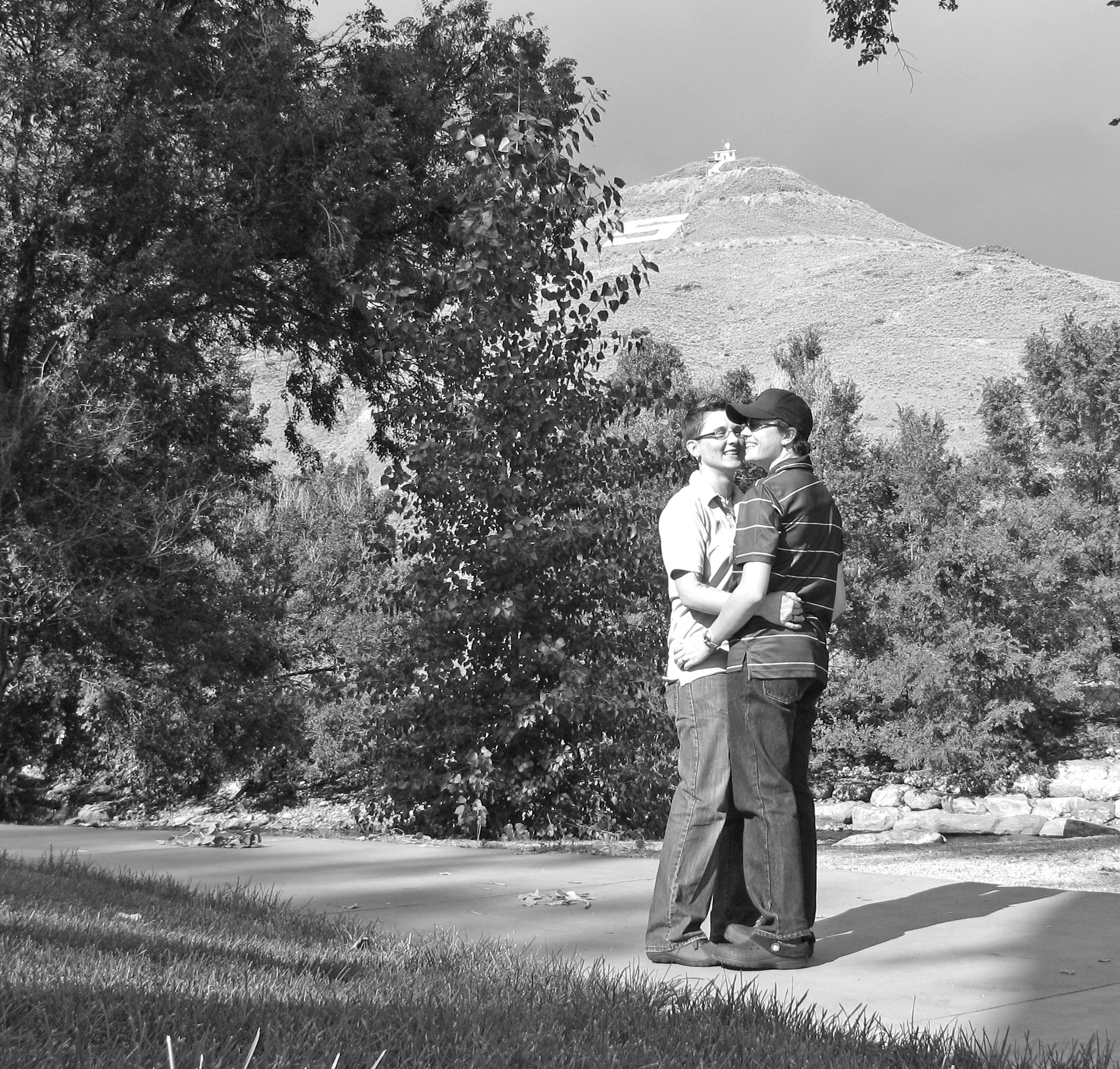By Jennifer Dempsey
This summer I was walking up F Street in Salida when I ran into Missy and Heather. I knew the women only slightly, had never had a real conversation with either, but that day they were radiating such happiness, I had to stop and say hello.
“How are you gals?” I asked.
They were holding hands, beaming, grinning ear to ear.
“We’re great,” Missy said, smiling at Heather. “We got married yesterday!”
“Congratulations!” I said automatically, then paused and thought, “what does that mean?”
“What does that mean?” I asked dumbly.
The women smiled at each other again.
“Nothing to the state of Colorado,” Missy answered, “but everything to us.”
“We Do”
On July 31, Salida natives Missy DeHerrera, 33 and Heather Adams, 30, exchanged marriage vows in front of 35 friends and family at a wedding ceremony at Goat Wadi Meadows in Maysville. Their “straight, male, all-around great guy” friend officiated the ceremony, combining traditional marriage vows with their own (“Nothing happens in God’s world by mistake”). Missy’s father walked her down the aisle, her mother walked Heather down the aisle. Missy’s daughter and Heather’s niece were bridesmaids; Heather’s sister and Missy’s childhood friend were maids of honor. Everyone celebrated afterwards at a barbeque reception at their home in Salida.

Heather and Missy said they wanted to get married for the same reason most couples do: “We wanted to commit to sharing our lives together,” Missy said. And they wanted to have a wedding for the same reason most couples do: “We wanted to commit to each other in front of family and friends,” Heather said.
Colorado Doesn’t.
For Missy and Heather and the other estimated 13,000 gay couples in the state of Colorado, legal marriage is not an option. Since 2006, the Constitution of Colorado was amended to ban same sex marriages and common law marriages between same sex partners. Civil unions are a legally recognized form of same sex partnerships but without many of the financial and legal benefits of marriage.
“There are over 1,100 laws pertaining to legal marriages that don’t to civil unions,” Missy said. “I can’t put Heather on my health insurance. I can’t claim her as a dependent even though I’m working while she’s going to school. If something were to happen to her, I couldn’t visit her in the hospital because I am not considered family. Getting married makes all things most people take for granted easy, but for me, I have to jump through hoops and sign power of attorney papers in order to be granted the same rights as any other person in a loving, committed relationship.”
“We’re not asking for special privileges,” Heather said, “just the same rights as everybody else.”
Who Does?
The federal government doesn’t recognize same sex marriage in the United States, but six states do: Connecticut, Iowa, Massachusetts, New Hampshire, New York and Vermont as well as Washington D.C.
This August, a Colorado Public Policy survey found that voters were evenly split over the legalization of same-sex marriage: 45% in support, 45% opposed, and 10% not sure. 71% supported legal recognition for same-sex couples, with 40% supporting same-sex marriage and 31% supporting civil unions. 27% opposed all legal recognition and 2% were not sure.
Even though their marriage isn’t legal in Colorado, Missy and Heather said they never considered moving.
“I never thought I should have to move to be who I am,” Missy said.
“The state of Colorado might not recognize it,” Heather said, “but in our hearts we are married.”
Growing up Gay
Both women grew up in Salida and both spent years denying who they were. Missy said she “played straight until 12 years ago when I had my daughter,” and Heather said she came out of the closet once she got sober.
“Abusing substances played a big part in denying who I was,” Heather said. “I told my sister when I was 12 that I thought I liked girls and she made me believe I shouldn’t feel that way. My parents still don’t feel comfortable with it. They like Missy but they didn’t come to the wedding. My mom was able to explain to me how they are happy that I am happy, but they don’t want to see the affection part of it. That rejection hurts.”
Missy said she has experienced verbal harassment (“Teenagers would holler ‘dyke’ as they drove past my house.”) and is currently in the middle of a wrongful termination lawsuit after being fired for being gay.
“They knew I was gay when I was hired,” she said. “I have spent almost my whole life in the closet, and am not ready to go back in because my employer doesn’t approve.”
Both said they wished there had been support for them growing up.
“There was nothing,” Missy said. “No LBGT or One Colorado* or anything like that. We want to start a gay-straight alliance in schools.”
“Definitely,” said Heather.
Pursuit of Happiness
In 1967, Chief Justice Earl Warren wrote in the landmark ruling of Loving v. Virginia, ‘The freedom to marry has long been recognized as one of the vital personal rights essential to the orderly pursuit of happiness by free men.’’ Warren was referring to interracial marriage, declaring that “banning races from intermarrying was an offence against human worth and dignity.” Proponents of same sex marriage today argue the same point: that denying any person the right to marry is a breach of the constitutional right of the “pursuit of happiness.”
“I get to wake up every morning with my wife,” Missy said. “Knowing that we’re married, even if it’s not legal, improves my quality of life tenfold.”
“Exactly,” Heather echoed.
“I am happy these two women have found the companionship they long for, that we all long for,” said Mike Orrill, pastor at First Presbyterian Church in Salida. “That they are the same gender seems to be unimportant in the face of their love for each other. The issue of same-sex marriage is huge at this point in our cultural history, both in church and society. And though the debate is, at times, acrimonious, the conversation is happening and that is a good thing. I suspect, considering the slow process of spiritual evolution, that 50 years from now same-sex marriage will be a non-issue. It will be an accepted and even celebrated union. We may even look back on this time surprised that it ever was an issue.”
“I can’t wait,” Heather said.
This Just In:
On Tuesday September 20, “Don’t ask, don’t tell” – the law which kept gay military men and women in the closet – was repealed.
“I think it is a huge step in the right direction,” Missy said. “We may not be able to legally get married in every state, but at least those that are fighting for our country and our freedom can have the freedom of being themselves. They risk their lives for our freedom, and until now were not allowed the simple freedom they had been fighting for. It is a huge thing to be able to be yourself. Let’s just hope the government will protect them from hate crimes as well.”
Anyone interested in a Gay-Straight Alliance in Chaffee County schools can contact Missy at 719-207-1156.
*One Colorado is a statewide advocacy organization dedicated to securing and protecting equality and opportunity for lesbian, gay, bisexual, and transgender (LGBT) Coloradans and their families.
Jennifer Dempsey is director of the Salida Circus and a freelance writer.
